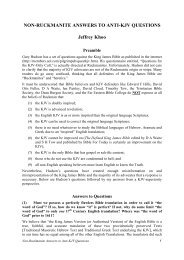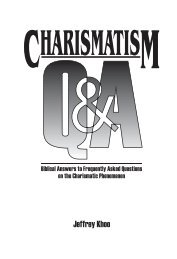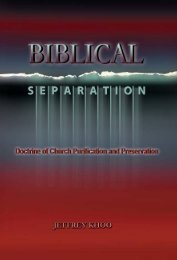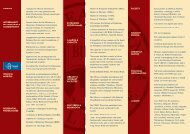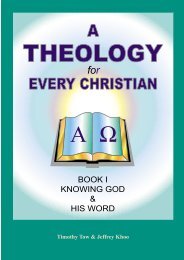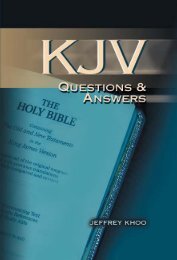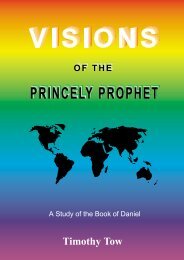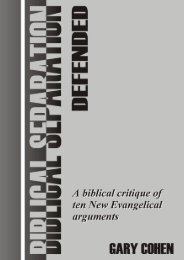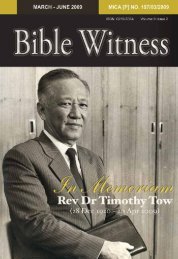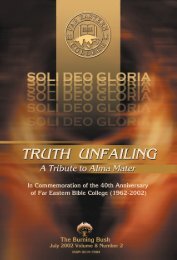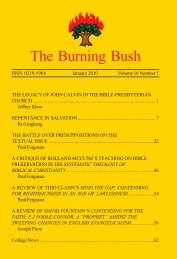50 Years Building His Kingdom - Far Eastern Bible College
50 Years Building His Kingdom - Far Eastern Bible College
50 Years Building His Kingdom - Far Eastern Bible College
You also want an ePaper? Increase the reach of your titles
YUMPU automatically turns print PDFs into web optimized ePapers that Google loves.
the terms of admission into its communion and the qualifications of its ministers<br />
and members, as well as the whole system of its internal government which<br />
Christ has appointed. In the exercise of this right it may, notwithstanding, err in<br />
making the terms of communion either too lax or too narrow; yet, even in this<br />
case, it does not infringe upon the liberty or the rights of others, but only makes<br />
an improper use of its own liberty and rights.<br />
5.3 Our blessed Saviour, for the edification of the visible Church, which is <strong>His</strong> body,<br />
appointed officers, not only to preach the Gospel and administer the Sacraments<br />
but also to exercise discipline for the preservation both of truth and duty; it is<br />
incumbent upon these officers and upon the whom Church, in whose name they<br />
act, to censure or cast out the erroneous and scandalous, observing in all cases<br />
the rules contained in the Word of God.<br />
5.4 Truth leads to goodness—the great touchstone of truth is its tendency to promote<br />
holiness—according to our Saviour’s rule, “by their fruits ye shall know them.”<br />
No opinion can be either more pernicious or more absurd than that which brings<br />
truth and falsehood upon a level and represents it as of no consequence as to<br />
what a man’s opinions are. On the contrary, we are persuaded that there is an<br />
inseparable connection between faith and practice, truth and duty; otherwise it<br />
would be of no consequence either to discover truth or to embrace it.<br />
5.5 Under the conviction of the above principle, we think it necessary to make effectual<br />
provision that all who are admitted as teachers be sound in the faith. We also<br />
believe that there are truths and forms with respect to which men of good character<br />
and principles may differ. And in all these, we think it the duty both of private<br />
Christians and societies to exercise mutual forbearance toward each other.<br />
5.6 Though the character, qualifications and authority of church officers are laid<br />
down in the Holy Scriptures, as well as the proper method of their investiture<br />
and institution, yet the election of persons to the exercise of this authority, in any<br />
particular society, is in that society.<br />
5.7 All church power, whether exercised by the body in general or in the way of<br />
representation by delegated authority, is only ministerial and declarative, that is<br />
to say, the Holy Scriptures are the only rule of faith and conduct. No church<br />
court ought to pretend to make laws to bind the conscience in virtue of its own<br />
authority; all its decisions should be founded upon the revealed will of God.<br />
Now though it will be easily admitted, that all synods and councils may err<br />
through the frailty inseparable from humanity, yet, there is much greater danger<br />
from the usurped claim of making laws than from the right of judging upon laws<br />
already made and common to all who profess the gospel, although this right, as<br />
necessity requires in the present state, be lodged with fallible men.<br />
5.8 If the preceding Scriptural and rational principles are steadfastly adhered to, the<br />
vigour and strictness of its discipline will contribute to the glory and happiness<br />
of any church. Since ecclesiastical discipline must be purely moral or spiritual in<br />
its object and not accompanied by any civil effects, it can derive no force whatever<br />
but from its own justice, the approbation of an impartial public, and the<br />
countenance and blessing of the great Head of the Church universal.<br />
Article 6 Principle and Practice of Biblical Separation<br />
6.1 The doctrine of separation from sin unto God is a fundamental principle of the<br />
<strong>Bible</strong>, one grievously ignored in the church today.<br />
6.2 This doctrine arises out of the holiness of God. Both the purity and righteousness<br />
of God (Luke 1:75) are involved. “Be ye holy; for I am holy.” (1 Pet 1:16,<br />
also 3:11; Exod 15:11; Isa 6:3; 2 Cor 7:1)<br />
Page 53




